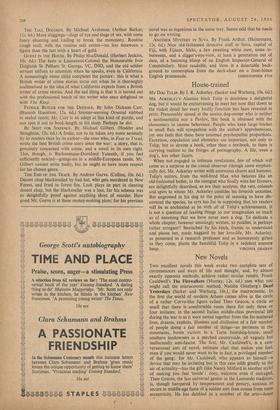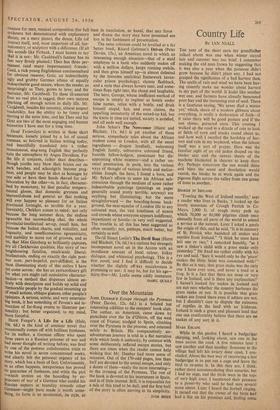New Novels
Two excellent novels this week evoke two complete sets of circumstances and ways of life and thought, and, by almost exactly opposite methods, achieve rather similar results. Frank Cauldwell's The Firewalkers (Murray, 12s. 6d.) uses what you might call the microcosmic method, Natalia Ginzberg's Dead Yesterdays (Seeker and Warburg, 16s.), the macrocosmic. In the first the world of modern Athens comes alive in the circle of a rather Corvo-like figure called Theo Grecos, a circle so small that there is comfortable room there for only three or four initiates; in the second Italian middle-class provincial life during the war is as it were netted together from the far-scattered lives, dreams, exploits, illusions and disillusion of a fair number of people doing a fair number of things—as partisans in the mountains, bomb victims in a Turin boarding-house, small southern landowners in a parched countryside, all vaguely but ineffectually anti-fascist. The first, Mr. Cauldwell's, is a con- versational sort of novel, intimate chat that makes you feel, even if you would never want to be in fact, a privileged member of the gang : for Mr. Cauldwell, who appears as himself—a device that may be irritating but in this case adds greatly to the air of actuality—has the gift (like Nancy Mitford in another style) of making you feel 'inside' : cosy, welcome even if outraged. Theo Grecos, the last universal genius in the Leonardo tradition, is, though hampered by temperament and penury, anxious to secure in middle-age fame of a soldier sort than comes from mere eccentricity. He has dabbled in a number of the arts—haute Dead Yesterdays is written in those short sentences, loosely joined by a lot of casual commas, so beloved in Italian writing today, and beautifully translated into a rather monotonous, sing-song English that perfectly suits the atmosphere by Angus Davidson. For the life it conjures, rather than describes— though youths may blow their brains out on Park benches, and schoolgirls become preg- nant, and people may be shot as hostages by one side or have their heads shaved for col- laboration by the other—is, in fact, character- ised by monotony, by that peculiar tempera- mental gloom, that domestic greyness and uneventfulness and general air that nothing Will ever happen so pleasant for an Italian Provincial fortnight, so terrible for a year. Inevitably, Chekhov comes to mind : not only because the long summer days, the endless agreeable but unrewarding chat, the whole Provincial-intellectual set-up, recall him, but because the Italian charm, and volatility, and loquacity, and unselfconscious egocentricity, and inability to move out of grooves, and so on, that Miss Ginzberg so brilliantly captures, are all Chekbovian qualities. Her story of two n eighbouring families, small-scale liberal- Intellectuals, ending on exactly the right post- War note, part-hopeful, part-diffident, is the Most illuminating study of this milieu I have Yet come across: she has an extraordinary gift for what you might call cumulative character- isation—a method that dispenses almost en- tirely with description and builds up solid and memorable people by the gradual mounting up of small actions, oblique glances, other people's ?Pinions. A serious, subtle, and very entertain- ing book, it has something of Pavese's sad in- vocation of far-flung events to illustrate per- sonality: but better organised; to my mind, More forceful.
Horst Fanger's A Life for a Life (Hale, 10s. 6d.) is the kind of amateur novel that occasionally comes off with brilliant freshness, for its author, a German officer who spent three years as a Russian prisoner of war and had never thought of writing before, was fired by one of the postwar collaboration trials to Write his novel in seven concentrated weeks, and clearly felt the personal urgency of his story, which has a basis of fact. Unfortunately, as so often happens, inexperience has proved no guarantee of freshness, and while the plot —which centres on the hounding by ex- Prisoners of war of a German who outdid his kussian captors in brutality towards other Germans—might have made it worth some- thing, its form is so novelettish, its style, at couture for men, musical composition (for full least in translation, so banal, that any force orchestra but demonstrated with explanatory shouts, on a mere piano), the dance, Life (of course) itself, and, most important of all, fan- tasiometry, or sculpture with a difference. (If all this sounds like Firbank, I must hasten to say that it is not : Mr. Cauldwell's fantasy has its feet very firmly planted.) Theo has three per- inahent (and many impermanent) friends: Cecil, a rich young Englishman continentalised for obvious reasons; Gotz, an indescribably ugly and grubby Gernian albino of equally indescribable good nature, whom the reader, as surprisingly as Theo. grows to love; and the narrator, Mr. Cauldwell. To these ill-assorted four no real plot is tagged, their own natures sparking off enough action in daily life. Mr. Cauldwell, besides his uncanny, almost suspect readability, has the ability to be funny and moving at the same time, and his Theo and his Gotz are two of the most engaging and human eccentrics I have met for a long time. and drama the story may have possessed are lost in the feebleness of presentation.
The same criticism could be levelled at -a far better book, Ricard Gehman's Driven (Peter Davies, 15s.), an American novel in which an interesting enough situation—that of a staid employee in a bank who suddenly makes off with a million dollars, keeps running awhile, and then gives himself up—is almost defeated by the tiresome analytical framework (avun- cular prison psychology), clumsy flashback, and a style that always hovers near, and some- times flops right into, the cheap and laughable. The hero. George, whose inefficient method of escape is simply to register at hotels under false names, retire with a bottle, and drink himself stupid, has, and even claims, the appalling immaturity of the mixed-up kid, but the knots in time are untied, society is satisfied, and all ends well enough.
John Sykes's The Newcomer (Hurst and Blackett, I I s. 6d.) is yet another of those serious, sympathetic tales about the African student come to London, with all the usual ingredients — dragon landlady, welcoming English family, subversive coloured friend, boorish fellow-lodgers, passionate but dis- appointing white mistress—and a rather un- usual penetration, in parts, into the various ways of thought of various levels and nation- - alities. Joseph, the hero, I found a bore, and Mr. Sykes's efforts to enter his African sub- conscious through the medium of some rather indescribable paintings (paintings on paper generally sound pretty terrible, anyway) are anything but illuminating; but the more straightforward = the boarding-house back- ground, the near-squalor of London life to any coloured man, the vast loneliness of streets and crowds where everyone appears indifferent, impertinent or hostile—is very well suggested. The trouble is, all this has been suggested so often recently: not, perhaps, much better, but certainly as well.
David Stuart Leslie's The Devil Boat (Hurst and Blackett, 13s. 6d.) is a curious but strangely incompetent novel set in the Azores with an inordinate amount of local colour, folksy dialogue, and whimsical psychology. This is a first novel, and I find it difficult to decide whether the slightly off-key macabreness is promising or not : it may be, but for his age- thirty-five—Mr. Leslie seems oddly immature.
ISABEL QUIGLY



























 Previous page
Previous page